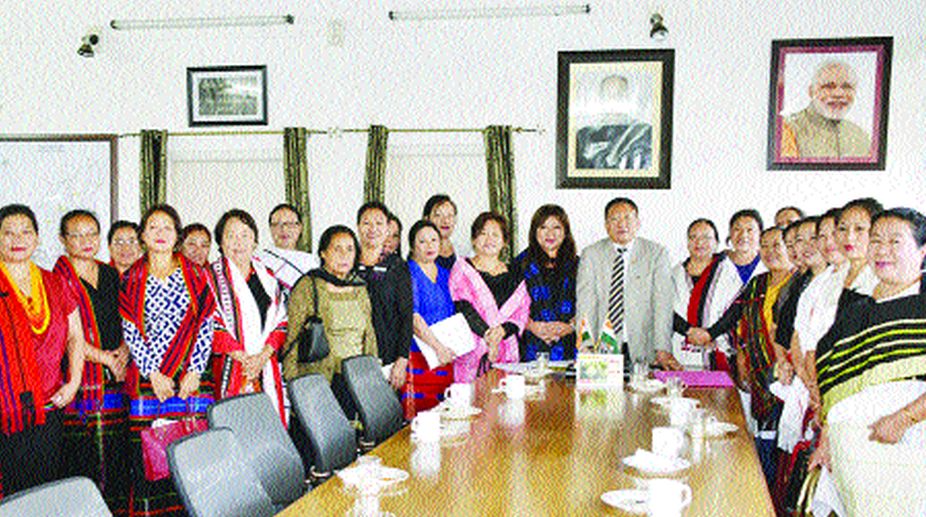Zayed Khan falls in love with Nagaland’s magical Hornbill festival
The Hornbill Festival, held annually in Nagaland, celebrates the state’s rich cultural heritage and tribal diversity through vibrant music, dance, crafts, and cuisine.

In the controversy over 33 per cent reservation for women in Nagaland’s urban local bodies, the most pertinent aspect — the economic connotations inherent in politically-empowering women through reservations— is yet to be discussed. To suggest that such reservations violate Article 371 (A) of the Constitution and will adversely affect Naga culture and customs would be to miss the whole point of the argument against reservations. It all revolves round land and related resources.
Naga culture and customs debar women from land ownership hence our customary laws preclude women from inheriting land. Land inheritance falls under three categories — ancestral property, acquired and gifted. Normally, under the first two, only sons, or others, or other male members of the family, can inherit such property.
Advertisement
In the second category, a daughter may inherit, if the father gifts his acquired land to his daughter(s) during his life-time, and leaves a will or expresses his will, which has to be respected by male members of the family/clan. Ancestral property is always clan-land. But, even the second and third categories are not without contest by male members of the family or clan. There still are divergent views on definitions of these categories. This is exactly what Article 371 (A) protects — the social, cultural and customary practices of the Nagas, which are mainly germane to land ownership and inheritance thereof. Much as Naga scholars acclaim that the Nagas’ is the “purest form of democracy” in our sovereign village-republics and compares it to the “democracy” of the Greek city-states, the fact is this “democracy” is pertinent only to males — for one, only they have the right to land ownership; two, only males can participate in the village parliament.
Advertisement
The core issue for Naga village-republics and Greek city-states were not culture and customs or political and martial issues but economics — for it is economics that spawn and dictate cultures and customs, as also political and martial expediencies. Against this very brief background, it is understandable why Naga male-dominated tribal bodies are opposing women’s reservations in ULBs — the fear is that women will finally have a say in how resources are to be used and shared in our towns, which has all the potentials to spill over to our villages.
So far, only men are privy to utilisation and sharing of resources allotted by the Central and state governments, as also available resources of clan and tribe land ownership. Arguably, with political powers comes economic powers — and with economic powers, political power is reinforced and consolidated. All of these also have the potential to disrupt the status quo in Naga society that has thus marginalised women politically and economically for centuries.
Male-dominated tribal bodies, as also individual Naga males, who oppose women’s reservation in ULBs – that do not come under the purview of traditional Naga decision-making bodies — opine that Naga men and women are equal and that the latter have high status in society. If so, why are women debarred from owning and inheriting immovable property and from decision-making bodies and process in our village-republics? If so, why different rules for men and women in our social practices; why rapes, domestic violence and other crimes against women? If so, why have women always been excluded from the martial activities of the village? The questions do not end here, but suffice it to say that patriarchal Naga society has never held men and women to be equals — the very opposition to women’s reservation in ULBs accentuates that — reinforced by Naga male-dominate tribal bodies’ recent dicta to ex-communicate anyone who contest the ULB elections with 33 per cent women’s reservation. Women’ reservation is necessitated in patriarchal societies for the historical fact of practiced culture of inequalities ubiquitous in Naga society — even if we don’t practice dowry, sati, female foeticide and infanticide and the caste-system.
All patriarchal societies and states deny women access to economic and political powers, starting with land ownership — the primary marker of power hierarchies. Opposition to women’s reservation in ULBs not only underlines the badly bruised Naga male ego but also definitely has critical economic connotations accentuating how their economic and political holds are perceived to be threatened, which few realise, much less acknowledge.
The writer is journalist-poet and editor of Dimapur-based Nagaland page
Advertisement